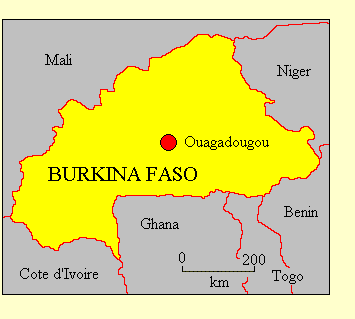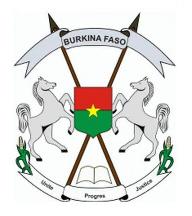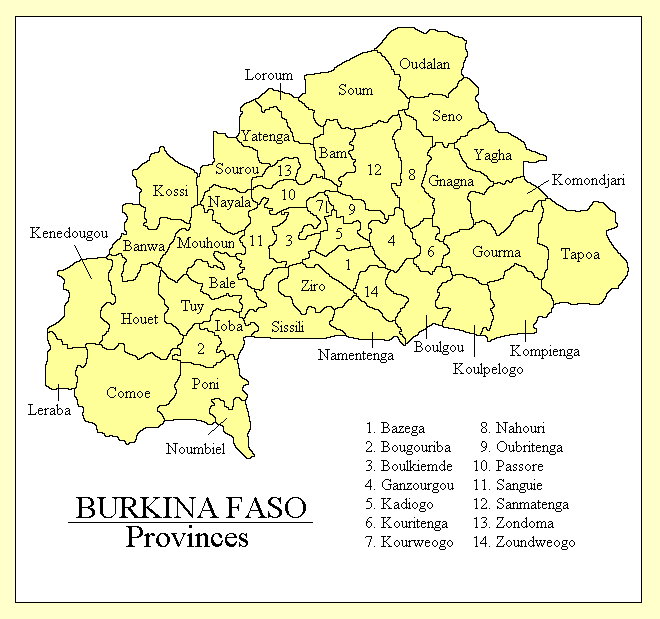

DEMOCRATIC REPUBLIC OF
BURKINA FASO
• Official name: Republique Democratique du Burkina Faso (Democratic Republic
of Burkina Faso)
• Location: West Africa
• International organisations: African, Caribbean and Pacific Group of States, African Union, Non-Aligned Movement,
Organisation Internationale de la Francophonie, Organisation of Islamic Conference, United Nations,
World Trade Organisation
• Borders: Benin, Cote d'Ivoire, Ghana, Mali, Niger, Togo
• Coastline: None
• Land area: 274,200 Km2
• Population: 15,800,000
• Annual GDP (PPP) per capita: US$1,200 (2009 CIA estimate). World ranking: 173
• Ethnicity: Almost the entire population is of West African stock, the largest ethnic
group being the Mossi (over 40% of the population). Other groups include the Gurunsi,
Senufo, Lobi, Bobo, Mande and Fulani.
• Languages: French is the official language and the language of business and the media.
Many Sudanic African languages, corresponding to the ethnic groups listed, are spoken.

• Religion: Sunni Moslem 50%, indigenous beliefs 40%, Catholic Christian 10%.
• Form of government: Presidential democratic republic. Burkina Faso is divided into 45 provinces.
• Capital: Ouagadougou
• Constitution: The Constitution of the Republic of Burkina Faso
came into effect on 11 June 1991.
• Head of state: The President, elected by direct universal suffrage for a seven-year term.
• Head of government: The Prime Minister, appointed by the President. The Prime Minister is the leader of the largest party in the legislature and is accountable to it.
• Legislature: Burkina Faso has a unicameral legislature, the
National Assembly (Assemblee Nationale) has 111 members elected for
five-year terms by proportional representation from multi-member constituencies. The upper house was abolished in 2002.
• Electoral authority: The National Independent Electoral Commission administers
national elections.
• Freedom House 2011 rating: Political Rights 5, Civil Liberties 3
• Transparency International Corruption Index: 31% (98 of 178 countries rated)
• Reporters Without Borders Press Freedom 2010 Index: 85% (49 of 178 countries rated)
• Heritage Foundation Economic Freedom 2010 Index: 60.6% (85 of 179 countries rated)
Political history
The French penetrated the upper reaches of the Volta River in the 1880s, and
annexed the Mossi kingdom in 1896. In 1919 the colony of Haute Volta was formed, but
in 1933 it was abolished and divided between Cote d'Ivoire and Niger. In 1947 the
French, seeking the support of the Mossi against nationalist groups in Cote d'Ivoire,
reconstituted the Haute Volta colony. In 1958 Haute Volta became self-governing
within the French Community, and full independence followed in 1960.

The democratic system left behind the French was overthrown in a coup in
1966, and several further coups followed. A group of radical officers led by Thomas
Sankara seized power in 1983 and inaugurated a socialist one-party regime, which renamed
the country Burkina Faso ("Land of the Honourable").
Sankara was assassinated in 1987 and succeded by Colonel
Blaise Campaore.
In 1991 Campaore allowed a return to democratic politics with a new
constitution. Campaore was the only candidate at the 1991 presidential election, and
since then he has been re-elected against only token opposition several times.
Although Burkina Faso is no longer
a one-party state, Campaore's socialist
Congress for Democracy and Progress is still the dominant party. Opposition
parties, of which the largest is the Alliance for Democracy and Federation-African Democratic
Rally, operate freely but have made little impact.
Freedom House's 2011 report on Burkina
Faso says: "Burkina Faso is not an electoral democracy. International monitors have judged the most recent presidential,
municipal, and legislative elections to be generally free but not entirely fair, due to the ruling CDP's privileged access to
state resources and the media. Monitors from civil society groups observed problems with the 2010 presidential elections,
including traditional leaders mobilizing voters for the incumbent, inadequate numbers of voting cards and ballots at the polls,
incorrect electoral lists, and the utilization of state resources for President Blaise Compaore's campaign...
The constitution guarantees the right to form political parties, and 13 parties are currently represented in the legislature...
Corruption remains widespread, despite a number of public and private anticorruption initiatives...
Although freedom of expression is constitutionally guaranteed and generally respected, many media outlets practice self-censorship...
The constitution provides for the right to assemble, though demonstrations are sometimes suppressed or banned...
The judicial system is formally independent, but it is subject to executive influence and corruption...
Human rights advocates have repeatedly criticized the military and police for committing abuses with impunity."
Updated October 2011
|

